



The U.K.-EU reset, announced in May 2025, could reshape India’s trade, diplomacy, and soft power. Harmonized regulations may ease exports ($86 billion to EU, $12 billion to U.K. in FY2024), while aligned foreign policies enhance India’s global role. Improved mobility could boost diaspora opportunities, but India must modernize to capitalize.

Copyright infringement not intended
Picture Courtesy: THE HINDU
The recent "reset" in relations between the United Kingdom and the European Union, presents a significant strategic opening for India.
UK exit from the EU in 2020. Since then, the U.K. 's relationship with the EU bloc has been strained. In May 2025, the new Labour government in the UK, has initiated a "reset," aiming for closer cooperation on trade, defense, food standards, fishing rights, and border checks.
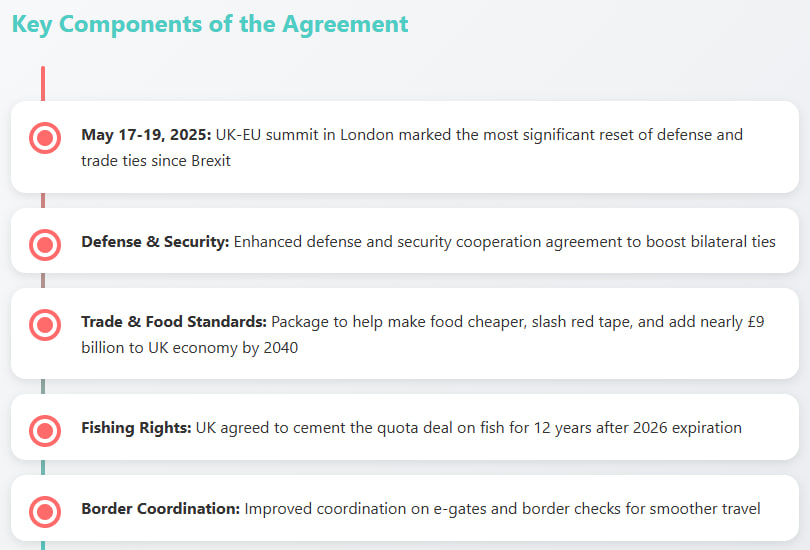 Impact on India's Trade and Economy
Impact on India's Trade and EconomySimplified Trade and Reduced Costs
Post-Brexit, Indian exporters faced the challenges of navigating two different sets of regulations for the U.K. and the EU. This created complexity and increased costs, especially for key sectors like pharmaceuticals, textiles, and seafood.
A harmonized U.K.-EU regulatory framework, particularly in areas like food safety and customs, would streamline compliance, reduce paperwork, and lower operational costs for Indian businesses.
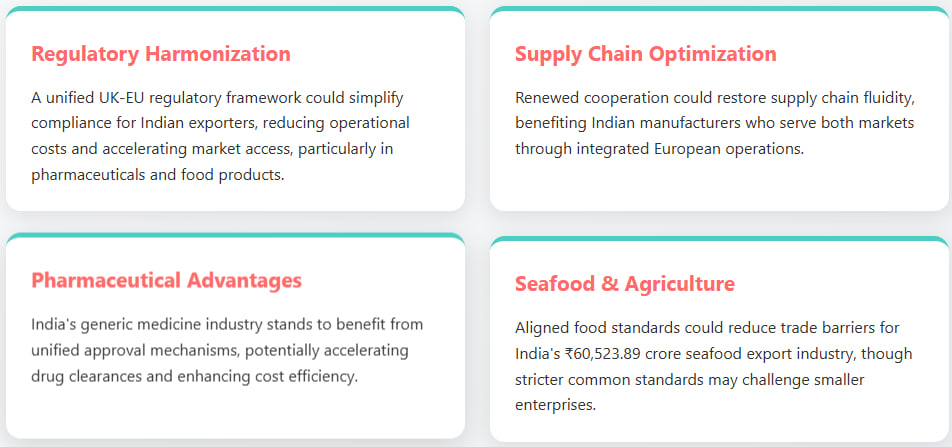
Challenge of Higher Standards
Closer U.K.-EU alignment could lead to stricter, unified standards for products which might pose a challenge for India's small and medium-sized enterprises (SMEs), that may lack the technical know-how or capital to meet these elevated requirements.
To remain competitive, India must strengthen its export ecosystem through schemes like the Remission of Duties and Taxes on Exported Products (RoDTEP) and the Production-Linked Incentive (PLI) scheme.
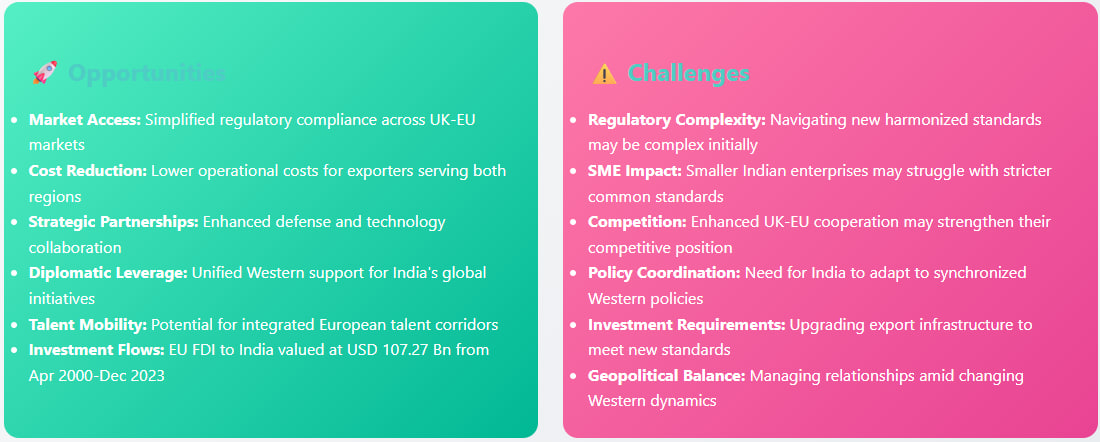
Boosting Bilateral Trade Deals
The improved U.K.-EU relationship provides a more stable and predictable environment for negotiating Free Trade Agreements (FTAs). India has been in talks for an FTA with both the U.K. and the EU. A closer alignment between them could potentially accelerate the FTA negotiations.
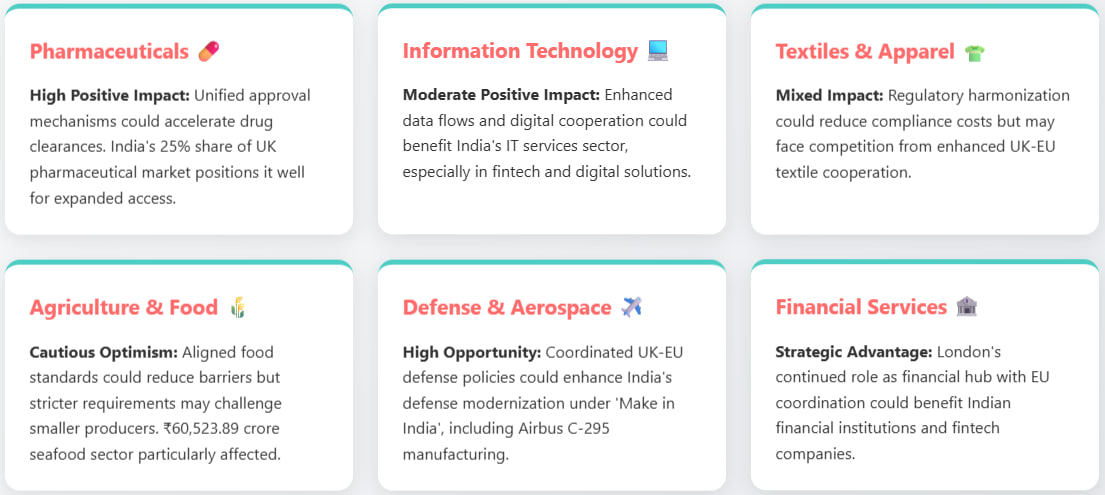 Geopolitical and Strategic Dimensions
Geopolitical and Strategic Dimensions
Multilateral Coordination
A more synchronized U.K.-EU foreign and defense policy presents an opportunity for India. India already has strategic partnerships with both, including the 'Roadmap 2030' with the U.K. and the 'Strategic Partnership: A Roadmap to 2025' with the EU.
A unified Western voice on global platforms like the G-20, UN, and WTO can be a significant advantage for India, especially in addressing shared concerns, such as China's growing assertiveness in the Indo-Pacific.
Defence and Security Cooperation
A coordinated U.K.-EU defense policy could pave the way for more trilateral or multilateral security engagements. The new U.K. government is seeking a new security pact with the EU, which could open doors for British defense companies to participate in EU defense programs, which aligns with India's goal of enhancing its naval power and technological capabilities through joint development and technology transfer.
India's Role in the Global South
India's leadership in the Global South, highlighted during its G-20 presidency, can be strengthened. By leveraging the U.K.-EU rapprochement, India can drive collective action on critical global issues like climate finance, digital infrastructure, and reforms in global governance.
Mobility and the Indian Diaspora
India has the world's largest diaspora, with communities in both the U.K. and the EU. Post-Brexit visa restrictions have been a challenge for Indian professionals. Renewed U.K.-EU coordination on border policies could create a semi-integrated talent corridor, could ease mobility for Indian students and professionals. While the number of Indian students going to the U.K. has seen a dip recently due to tighter visa norms, India still represents the largest group of students granted leave to remain on the Graduate Route visa
India has been signing Migration and Mobility Partnership Agreements (MMPAs) with European countries like Germany, France, and the U.K. to facilitate legal migration. A broader U.K.-EU framework on mobility could strengthen these bilateral agreements and create more opportunities for Indians.
Economic and Trade Modernization => India needs to accelerate domestic reforms, upgrade its export infrastructure to meet higher standards, and empower its Small and Medium Enterprises (SMEs) to compete globally. Finalizing the Free Trade Agreements (FTAs) with both the U.K. and the EU is a critical and immediate priority.
Assertive Diplomatic Engagement => India should position itself as a key 'balancing power' in the Indo-Pacific, lead the Global South's agenda on the world stage, and deepen trilateral cooperation with the U.K. and EU nations on defense and security.
Leveraging Human Capital and Soft Power => India must negotiate comprehensive mobility pacts for its students and professionals, actively engage its influential diaspora, and promote 'Brand India' as a modern hub for innovation and talent.
India must take swift and decisive action across economic, diplomatic, and social fronts to transform the European reset into a significant opportunity for its own global advancement.
Must Read Articles:
INDIA EUROPEAN UNION RELATIONS
UK-EU Reset Deal: Post-Brexit Ties
Source:
|
PRACTICE QUESTION Q. How can India leverage the UK-EU reset to enhance its position in Indo-Pacific geopolitics? 150 words |

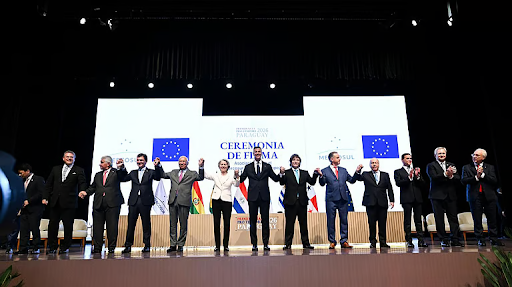

© 2026 iasgyan. All right reserved